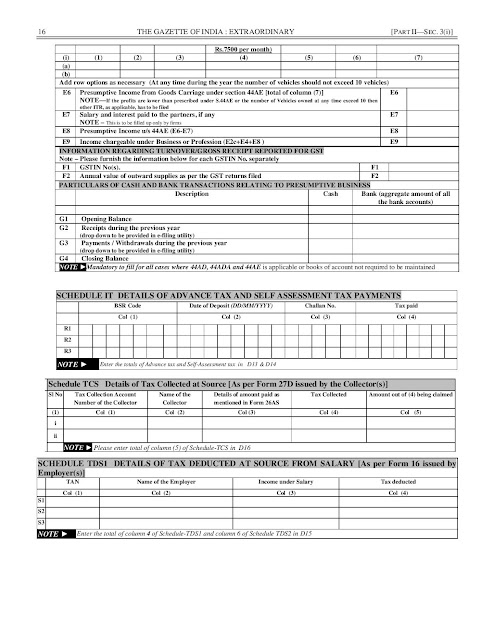The Income-tax (1st Amendment) Rules, 2020
The Central Board of Direct Taxes (CBDT) on January 03, 2020, has published the Income-tax (1st Amendment) Rules, 2020 to notify Forms ITR-1 and ITR-4 for the Assessment year 2020-21.
Rule 12 which specifies the procedure for filing Return of income and return of fringe benefits will be substituted, namely:
- The assessment year for filing return has been substituted from 2019 to 2020 in the opening paragraph.
- In clause 1(a) proviso will be amended:
i. in item (V), the word “or” occurring at the end will be omitted
ii. after item (VI), the following items will be inserted, namely:
b) (VIII) is required to furnish a return of income under seventh proviso to sub-section (1) of section 139
- In clause 1(ca): in the proviso, after item (V), the following item shall be inserted, namely: (VI) owns a house property in joint-ownership with two or more persons.
- Form “Sahaj (ITR-1)” and “Sugam (ITR-4)” will be substituted, namely:
a) Form ITR-1 Sahaj:
For individuals being a resident (other than not ordinarily resident) having total income upto Rs.50 lakh, having Income from Salaries, one house property (single ownership), interest income, Family pension income etc. and agricultural income upto Rs.5 thousand. But not for an individual who is either Director in a company or has invested in unlisted equity shares or has any brought forward / carry forward loss under the head ‘Income from House Property’ or has to furnish return under seventh proviso to section 139(1) of the Income Tax Act, 1962.
b) Form ITR-4 Sugam:
[For Individuals, HUFs and Firms (other than LLP) being a resident having total income upto Rs.50 lakh, one house property (single ownership), having income from business and profession which is computed under sections 44AD, 44ADA or 44AE or Interest Income, Family pension etc. and agricultural income upto Rs.5 thousand. But not for an individual who is either Director in a company or has invested in unlisted equity shares or has any brought forward / carry forward loss under the head ‘Income from House Property’.
They will come into force with effect from April 01, 2020.
MINISTRY OF FINANCE
(Department of Revenue)
(CENTRAL BOARD OF DIRECT TAXES)
NOTIFICATION
New Delhi,the 3rd January, 2020
INCOME-TAX
G.S.R. 9(E).—In exercise of the powers conferred by section 139 read with section 295 of the Income-tax Act, 1961 (43 of 1961), the Central Board of Direct Taxes hereby makes the following rules further to amend the Income-tax Rules, 1962, namely:-
1. Short title and commencement
(1) These rules may be called the Income-tax (1st Amendment) Rules, 2020.
(2) They shall come into force with effect from the 1st day of April, 2020.
2. In the Income-tax rules, 1962 (hereinafter referred to as the principal rules), in rule 12,−
(a) in sub-rule (1),-
(I) in the opening portion, for the figures “2019”, the figures “2020” shall be substituted;
(II) in clause (a), in the proviso,-
(i) in item (V), the word “or” occurring at the end shall be omitted;
(ii) after item (VI), the following items shall be inserted, namely:-
“(VII) owns a house property in joint-ownership with two or more persons; or
(VIII) is required to furnish a return of income under seventh proviso to sub-section (1) of section
139.”;
(III) in clause (ca), -
(ii) in the proviso, after item (V), the following item shall be inserted, namely:-
“(VI) owns a house property in joint-ownership with two or more persons.”;
(b) in sub-rule (5), for the figures “2018”, the figures “2019” shall be substituted.
3. In the principal rules, in Appendix II, for Form “Sahaj (ITR-1)” and “Sugam (ITR-4)”, the following Forms shall,
respectively, be substituted, namely:-
[Notification No. 01/2020/F. No. 370142/32/2019-TPL]
ANKUR GOYAL, Under Secy.
Note : The principal rules were published in the Gazette of India, Extraordinary, Part-II, Section 3, Sub-section (ii) vide notification number S.O.969(E), dated the 26th March, 1962 and last amended by the Income-tax (16th Amendment) Rules, 2019, vide notification number GSR. 960(E), dated 30th December, 2019.
 |
| Central Board of Direct Taxes |
What is CBDT?
Central Board of Direct Taxes
The Central Board of Direct Taxes is a statutory authority functioning under the Central Board of Revenue Act, 1963. The officials of the Board in their ex-officio capacity also function as a Division of the Ministry dealing with matters relating to levy and collection of direct taxes.
The Central Board of Revenue as the apex body of the Department, charged with the administration of taxes, came into existence as a result of the Central Board of Revenue Act, 1924. Initially the Board was in charge of both direct and indirect taxes. However, when the administration of taxes became too unwieldy for one Board to handle, the Board was split up into two, namely the Central Board of Direct Taxes and Central Board of Excise and Customs with effect from 1.1.1964. This bifurcation was brought about by constitution of two Boards u/s 3 of the Central Board of Revenue Act, 1963.
The Central Board of Direct Taxes consists of a Chairman and following six Members: -
- Chairman
- Member (Income-tax)
- Member (Legislation & Computerisation)
- Member (Personnel & Vigilance)
- Member (Investigation)
- Member (Revenue)
- Member (Audit & Judicial)








Comments